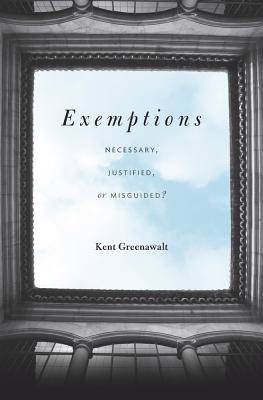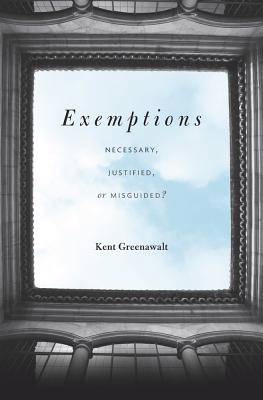
- Retrait gratuit dans votre magasin Club
- 7.000.000 titres dans notre catalogue
- Payer en toute sécurité
- Toujours un magasin près de chez vous
- Retrait gratuit dans votre magasin Club
- 7.000.0000 titres dans notre catalogue
- Payer en toute sécurité
- Toujours un magasin près de chez vous
Description
Should laws apply equally to everyone, or should some individuals and organizations be granted exemptions because of conflicting religious or moral convictions? In recent years, this question has become intensely controversial in America. The Supreme Court's ruling on same-sex marriage, in particular, has provoked barbed debates about legal exemptions. At the core of these debates lies the question of whether basic values of equality and nondiscrimination are at odds with the right to live according to one's religious beliefs.
In Exemptions: Necessary, Justified, or Misguided? Kent Greenawalt draws on his extensive expertise to place same-sex marriage and other controversies within a broader context. Avoiding oversimplification and reflecting a balanced consideration of competing claims and harms, he offers a useful overview of various types of exemptions and the factors that we should take into account when determining the justice of a particular exemption.
Through a close study of several cases, from doctors who will not perform abortions to institutions that do not pay taxes, Greenawalt demonstrates how to weigh competing values without losing sight of practical considerations like the difficulty of implementing a specific law. This thoughtful guide to exemptions will prove an invaluable resource as America struggles to come to terms with Obergefell v. Hodges, Burwell v. Hobby Lobby, and similar controversies. Exemptions shows how to reach the most just and desirable legal conclusions by respecting those who wish to live according to different fundamental values.
Spécifications
Parties prenantes
- Auteur(s) :
- Editeur:
Contenu
- Nombre de pages :
- 288
- Langue:
- Anglais
Caractéristiques
- EAN:
- 9780674659872
- Date de parution :
- 25-04-16
- Format:
- Livre relié
- Format numérique:
- Genaaid
- Dimensions :
- 160 mm x 239 mm
- Poids :
- 544 g

Les avis
Nous publions uniquement les avis qui respectent les conditions requises. Consultez nos conditions pour les avis.






